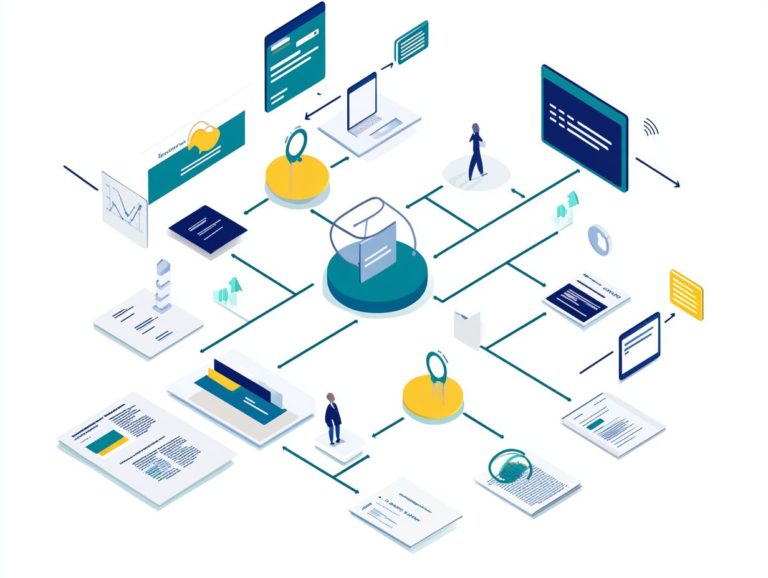How to Evaluate CRM Software Vendors?
Choosing the right CRM software vendor is crucial for businesses. It helps strengthen customer relationships and optimize operations.
With a myriad of options at your fingertips, sifting through features, pricing models, and integrations can feel daunting. This article explains the key factors you should consider when evaluating CRM vendors, highlighting essential features, the level of customer support, and the necessity of aligning solutions with your unique business needs.
This article gives you a clear roadmap to make the best choice for your business, setting your organization up for enduring success.
Contents
- Key Takeaways:
- Key Factors to Consider When Evaluating CRM Software Vendors
- Steps to Evaluate CRM Software Vendors
- Making the Final Decision
- Frequently Asked Questions
- What factors should I consider when evaluating CRM software vendors?
- What are some important features to look for in CRM software?
- How can I determine if a CRM software vendor is reputable?
- Should I choose a CRM software vendor based on pricing alone?
- How important is customer support when evaluating CRM software vendors?
- What are some tips for comparing CRM software vendors?
Key Takeaways:

Get ready to transform your business with the perfect CRM solution! Consider your business needs and research multiple vendors to find the features and functionality that best fit your company’s goals and processes. Take advantage of free trials and demos to get a hands-on experience with the software and gather feedback from industry experts and peers. When making the final decision, consider not only the cost and pricing models but also the implementation and onboarding process, as well as long-term support and maintenance options.
What is a CRM Software Vendor?
A CRM software vendor is essentially your go-to company for tools to manage customer relationships. These solutions are crafted to enhance your business processes, boost sales performance, and cultivate stronger customer relationships.
They offer advanced features like contact management, lead management, and marketing automation, all tailored to fit various industries and business sizes. Plus, they ensure you stay compliant with privacy regulations like GDPR, which is a regulation that protects customer privacy in Europe, all while providing robust data security and seamless integration capabilities.
By utilizing cloud-based platforms, these vendors allow you to access your CRM systems from virtually anywhere, fostering flexibility and collaboration within your teams. Automation features take the grunt work off your plate, letting your sales and marketing teams concentrate on strategy instead of getting bogged down in administrative tasks.
With a strong focus on data security, sensitive customer information remains protected, which in turn builds trust between your business and your clients. These CRM software vendors play a key role in streamlining operations, enhancing efficiency, and driving sales growth, all while offering a more personalized user experience.
Key Factors to Consider When Evaluating CRM Software Vendors
Evaluate each CRM vendor carefully. Focus on key factors that boost your customer management success!
It’s essential to consider several key factors that can greatly influence the effectiveness of your customer relationship management efforts.
Pay close attention to the vendor’s CRM evaluation checklist, their pricing tiers, implementation timelines, and their capability to address your specific business needs, particularly in relation to customer satisfaction and sales performance.
Each of these elements can play a pivotal role in ensuring that the CRM solution you choose aligns seamlessly with your goals.
Features and Functionality
Features and functionality serve as the backbone of any CRM software, shaping how effectively you manage customer data, enhance sales cycles, and automate various business processes, ultimately elevating the overall user experience.
A robust CRM system should include essential features like lead capture, enabling you to effortlessly gather and track prospective clients.
Effective contact management tools will streamline your communication and help you maintain organized client profiles, leading to more personalized interactions.
Comprehensive reporting capabilities give you the power to analyze sales performance and customer trends, ensuring your decisions are data-driven.
Ticket management functionalities will guarantee a prompt response to customer inquiries, enhancing overall satisfaction.
Together, these features create a cohesive environment that drives efficiency, fosters relationships, and promotes growth, significantly contributing to your organization’s bottom line.
Integration and Compatibility
Integration and compatibility are crucial factors to consider when choosing CRM software vendors. They influence how well your CRM systems can connect with your existing software platforms.
This synergy enhances user experience, allowing teams to share data effortlessly across marketing automation, field service management, and analytics tools. When these systems communicate smoothly, you can streamline operations and eliminate duplicate entries.
For instance, integrating your CRM with marketing automation solutions automates lead tracking and creates personalized customer interactions, boosting conversion rates. Seamless integration with analytics platforms provides valuable insights, helping teams monitor performance metrics and optimize strategies.
The compatibility of these tools increases operational efficiency and transforms your workflow into a more dynamic and responsive process.
Cost and Pricing Models

Understanding the cost and pricing models of CRM software vendors is essential for informed purchasing decisions. These models differ significantly and impact the value of your customer relationships and support features.
As you evaluate pricing structures, consider factors like subscription-based models, one-time licenses, and any potential hidden costs. You don t want surprises later!
Assessing the unique features offered at each pricing tier helps determine which option aligns with your objectives and budget. Incorporating CRM costs into your sales budget is vital for maximizing your investment.
A well-chosen solution enhances efficiency and nurtures stronger customer connections. Striking the right balance between affordability and functionality is key!
Customer Support and Training Options
Customer support and training are essential for leveraging your CRM systems effectively. They enhance the overall user experience throughout the sales cycle.
With various support options from CRM vendors, like training modules, knowledge bases, and multiple direct support channels, you can streamline your onboarding process. This makes it easier for your team to adapt!
This approach helps tackle the initial learning curve and fosters a culture of continuous improvement. When you support your team, they thrive, leading to higher adoption rates.
Robust customer support transforms user experiences, laying a strong foundation for loyalty and operational efficiency.
Steps to Evaluate CRM Software Vendors
Evaluating CRM software vendors requires a methodical approach. Start by identifying your specific business needs, then research available options using strategies for CRM system evaluation.
Compare different vendors, focusing on their features and capabilities. Don’t overlook the value of free trials and demos; these are crucial for ensuring your choice aligns with your organization’s strategic goals!
By following this thorough process, you can make a well-informed decision that supports your business growth.
Identify Your Business Needs
Identifying your business needs is the essential first step in evaluating CRM software vendors. This process clarifies your goals for customer relationship management and enhances sales performance.
Taking an inventory of your current workflows and assessing sales cycles provides insights into existing customer relationship challenges. This practice uncovers areas needing improvement and sets clear, measurable goals.
This clarity guides your selection process, ensuring solutions align closely with your organization’s unique context. Understanding these elements lays a solid foundation for nurturing client relationships, paving the way for growth and a stronger market presence.
Research and Compare Vendors
Researching and comparing vendors is crucial in your CRM journey. It helps you pinpoint software platforms that fit your needs regarding pricing, features, and support.
Explore various research methods like reviews, testimonials, and demos. These tools provide insights that guide your decision-making process.
Create a comparison matrix to enhance clarity. This structure allows you to evaluate essential features side by side.
Consider aspects like integration capabilities and scalability. A visual representation simplifies your choices and empowers you to make informed selections.
Take Advantage of Free Trials and Demos

Free trials and demos are smart strategies in your CRM evaluation. They let you experience the software firsthand and check if it fits your business needs.
This experience offers insights into user interfaces that may be missed in a presentation. You’ll also access training resources to bolster your understanding.
As you explore various features, you’ll see how well a CRM works with your workflows. This hands-on approach gives you the power to make informed decisions by revealing strengths and weaknesses.
Consult with Industry Experts and Peers
Talking to industry experts and peers provides valuable insights into CRM evaluation. Their shared experiences and recommendations guide you through countless options.
Engage with thought leaders in forums and webinars. This connection unlocks diverse perspectives that can help you make better decisions.
Exchanging ideas is key; it helps you evaluate the pros and cons of different CRM solutions. Leveraging these platforms equips you with critical data for selecting the best fit.
Making the Final Decision
Choosing the right CRM vendor can be exciting but requires careful thought. Pay attention to long-term support and how the software aligns with your evolving needs.
This decision goes beyond just a transaction; it builds a solid foundation for future growth.
Factors to Consider
When deciding on your CRM, consider implementation time and user experience. Assess how effectively the solution can boost customer satisfaction and support sales.
Also, check how well the CRM integrates with your existing tools. A smooth transition can significantly impact team adoption rates.
Don’t overlook scalability; anticipate growth to ensure the system can adapt. Finally, understand the analytics capabilities; robust reporting informs strategic decisions.
Your CRM should align with your business objectives and enhance efficiency, client relationships, and revenue growth.
Implementation and Onboarding Process
The implementation and onboarding process for a CRM system is an important step that sets the tone for a smooth transition. It significantly impacts user training, data migration (moving your existing data to the new system), and overall adoption of new support features.
You ll want to kick off with a well-structured plan that starts by assessing your organization s specific needs. Identify key stakeholders and establish clear timelines for each phase.
During the integration stage, ensuring compatibility with your existing tools is essential. Safely and accurately migrating data is crucial to prevent any information loss.
Training sessions should be crafted to empower users. Provide them with hands-on experience and tailored resources they need to unlock the true potential of your CRM!
By prioritizing effective onboarding strategies, you can greatly enhance the user experience. This leads to higher satisfaction rates as employees become more confident and capable of utilizing the new system s features to the fullest.
Long-Term Support and Maintenance

When evaluating CRM options, it s crucial for you to consider long-term support and maintenance. This ensures that the software you choose can adapt to your evolving business needs while fostering strong customer relationships through effective user experience management.
Investing in ongoing support helps you troubleshoot any issues that may arise and guarantees that the software remains up-to-date with the latest features and security protocols. Keep your CRM updated to stay ahead of the competition!
Training your staff is crucial, as it empowers users to fully leverage the CRM’s capabilities, boosting productivity and overall satisfaction.
These elements work together to enhance the longevity and effectiveness of your CRM system. This allows your business to respond to market shifts and customer expectations, ultimately nurturing a more resilient and engaged customer base.
Frequently Asked Questions
What factors should I consider when evaluating CRM software vendors?
- Vendor’s reputation
- Customer reviews
- Features and functionality of the software
- Pricing
- Customer support
- Integration options
What are some important features to look for in CRM software?
- Contact management
- Sales and marketing automation
- Reporting and analytics
- Mobile access
- Customization options
Depending on your business needs, you may also want to consider features such as social media integration, lead scoring, and customer service tools.
How can I determine if a CRM software vendor is reputable?
To determine the reputation of a CRM software vendor, research online for reviews and ratings from other customers. Ask for recommendations from other businesses and look into the vendor’s history and track record of delivering quality products and services.
Should I choose a CRM software vendor based on pricing alone?
No, you should not choose a CRM software vendor based on pricing alone. While affordable pricing may be important, it is also crucial to consider the features, functionality, and customer support offered by the vendor.
Choosing a vendor solely based on price could result in software that does not meet your business needs and proves costly in the long run.
How important is customer support when evaluating CRM software vendors?
Customer support is a crucial factor to consider when evaluating CRM software vendors. You want to choose a vendor that offers reliable and accessible customer support in case you encounter any issues or need assistance with using the software.
Look for vendors that offer various support channels such as phone, email, and live chat.
What are some tips for comparing CRM software vendors?
When comparing CRM software vendors, create a list of your business needs and prioritize the features and functionality that are most important to you. This will help you narrow down your options and make a more informed decision.
Additionally, request demos and trials from different vendors to see how their software works and if it meets your requirements.
Contact us today to get started with your CRM journey!






